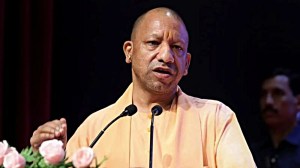Even Lord Ram fell for attractive packages, why not you? — Govindacharya
New Delhi, Nov 15: The British were alien rulers, but what we got when the left were simply alienated ones! The Viceroys lived in vicereg...

New Delhi, Nov 15: The British were alien rulers, but what we got when the left were simply alienated ones! The Viceroys lived in viceregal lodges to show they were superior to us, but post-independence rulers live in them too. The west is now talking of developing social capital, but India has always had support systems such as family and village communities …
Yawn. While swadeshi idelogue and the BJP’s ex-general secretary K.N. Govindacharya got plenty of approving nods from the believers at his first public outing after he fell from grace some months ago, his theme today ran along predictable lines. Just as socialism was something we picked up blindly before it failed us, he expounded, there’s now a major crisis in capitalism as well — all this, of course, was supposed to be a direct confirmation of the fact that the `Indian’ way was perfect. Indeed, the audience at the Constitution Club today, took it to be so. Encouraged, Govindji warmed up to propound that capitalism is a direct result of `exclusive Judaic thinking’ — essentially, his way of saying that capitalists think that only their methods work, and all other economic systems are flawed.
Outlining how capitalism is very appealing, he said he didn’t blame people for advocating its effectiveness. Even Lord Ram, said Govindacharya with complete authority, was fooled by attractive packaging. When he saw a `bagula’ (crane) approaching the water very carefully, so that it’s feet never crushed anything, Lord Ram thought the crane had become non-violent. The frog in the river, however, told Lord Ram that the crane looked non-violent, but it was walking that way only to fool the frog, so that it could eventually eat it, just the way it had done with all the other frogs.
But just when you got ready to walk out, bored by the familiar smug diatribe, the brilliant swadeshi ideologue sprung a surprise. What have we done to fix our rivers, our jungles, our agriculture, Govindacharya asked. Have we looked for ways to increase productivity, which will involve all of our population instead of just concentrating one one miniscule area? No foreigners are going to do this for us, we have to fix these if we want to do well; all countries like the US or those in Europe, have done well because they worked hard, he added.
So, is globalisation all evil? Govindacharya didn’t quite say so in so many words, but he raised enough doubts to make it sound so. It’s easy, he said, for capitalists to argue that we should allow contract farming, or allow corporates to get into agriculture, but what will this do to the poor farmer, he thundered. What indeed? Since no one in the audience thought it worth while asking — they were mostly there because they agreed with him anyway — Govindacharya didn’t have to give an answer. He didn’t have to grope with uncomfortable numbers like the fact that India loses fruits and vegetables worth around Rs 50,000 crore each year simply because small farmers don’t have expensive cold-chains to preserve their produce — so if large corporates got into agriculture, and saved this waste, some of this would be shared with the farmer.
That’s, of course, why Govindacharya is so brilliant — you can’t pin him down to one argument, because he makes so many simultaneously. If he was given the example of the waste in food because of the lack of cold chains, he would say that he’s not opposed to corporates coming into this sector.
Have a sense of history, a pride in your past, he exhorted the audience, and correctly so. He cited the instance of how China developed its own model of growth (ignored how it’s now desperately trying to become part of the WTO), and talked of the US has said that if WTO rules run contrary to the provisions of its Constitution, the WTO rules will not prevail. That’s sound stuff (except, I’m not sure if the US propounded its philosophy in such a straight-forward fashion), and India should surely be looking at indigenous models of growth. But Govindacharya made it sound like a battle cry for India thumbing its nose at the WTO, that it was being a capitalist lap dog for not doing so. The truth, however, is far from so simple. As Govindacharya himself mentioned, though in passing, India’s share in world trade is a mere 0.5 per cent. Now does he really think the country can derive any significant mileage in such a situation, that India can afford to act as tough as he says the US is?
The quicksilver Govindacharya, of course, says that he’s not advocating getting out of WTO, just that we should have faith in ourselves, and argue from a position of strength! That may sound convoluted but, to use Govindacharya’s phrase, it certainly isn’t `exclusive Judaic thinking.’
Photos


- 01
- 02
- 03
- 04
- 05





























